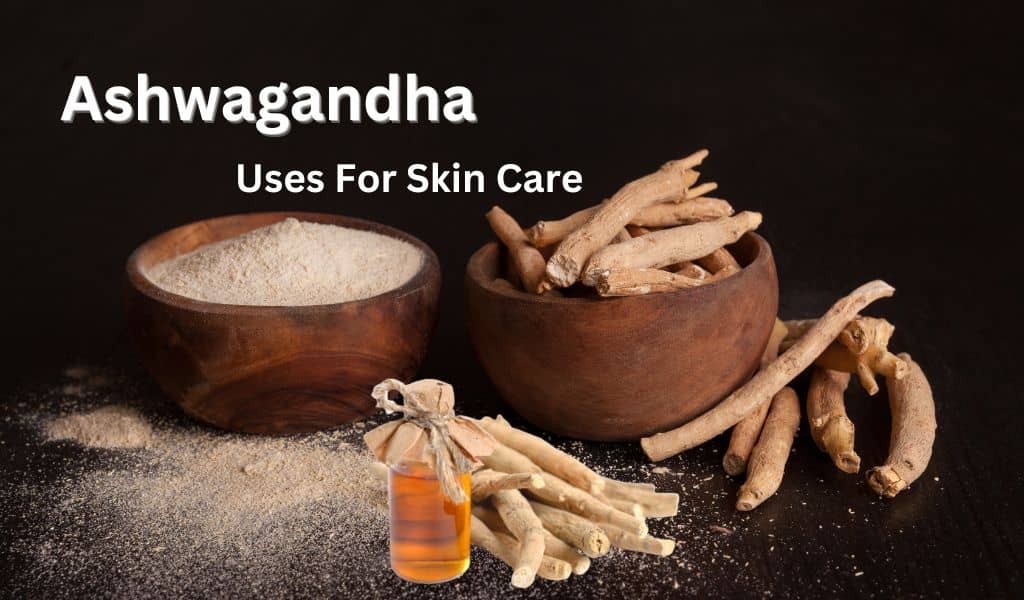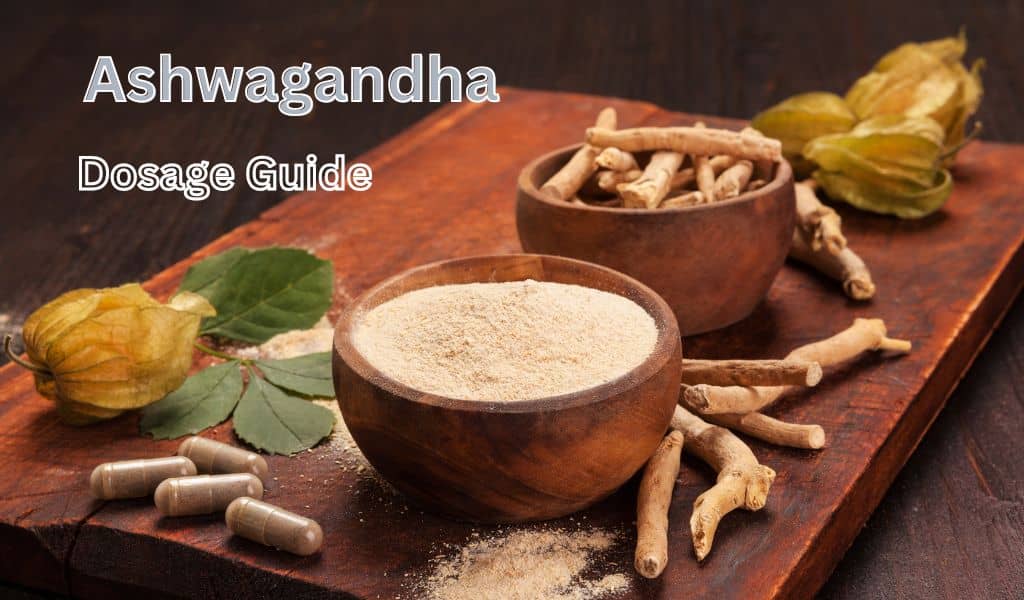The ashwagandha benefits have been well known since the beginning of Ayurveda. It is an essential element of Ayurveda and is used to treat various ailments. It is used to treat of pain, inflammation, stress, and fatigue.
Ashwagandha root extracts increase telomerase activity, increasing the life of healthy skin cells. It is also an effective hair growth stimulator and can aid in the prevention of follicle, scalp, and hair tissue damage.
The high antioxidant content of Ashwagandha aids in the cure of skin ageing signs such as wrinkles, fine lines, blemishes, and dark spots. Because of its numerous hair benefits, it is renowned as the ‘Queen of herbs’ in Ayurveda.
Ashwagandha
Ashwagandha is a key plant in Ayurveda, a historic type of alternative medicine based on Indian ideas of natural healing. The Ashwagandha is Sanskrit for “horse smell,” referring to both the herb’s aroma and its capacity to improve strength.
The ayurvedic herb Ashwagandha, often known as Indian ginseng, Indian winter cherry, or poison gooseberry, is an adequate immune booster. It is a non-toxic herb that works on the HPA axis and neuroendocrine system to assist regulate body systems.
Ashwagandha shrub is perennial in nature and grows to a height of 1.5 metres. It is largely native to India and portions of the Mediterranean and Africa. The leaves are oblong to elliptic in shape with a dull greenish color.
The ashwagandha plant is a small shrub native to India and Southeast Asia with yellow flowers. Extracts or powder made from the plant’s root or leaves are used to treat a variety of ailments, including anxiety and infertility.
Ashwagandha Benefits
In Ayurvedic medicine, ashwagandha is a vital herb. This is the oldest medical systems in the world, and the India’s healthcare systems. Ashwagandha is classified as a Rasayana in Ayurvedic medicine. It aids in the preserving of youth, both mentally and physically.
The plant has neuroprotective and anti-inflammatory properties. Many health conditions are caused by inflammation, and lowering inflammation helps protect the body from a range of illnesses. Different treatments use various elements of the plant, such as the leaves, seeds, powder and fruit.
Health benefits
Ashwagandha benefits have been related to a variety of skin concerns such as pigmentation, acne and breakouts, premature ageing, and skin cancer. Small airborne contaminants become stuck in pores and cause skin damage by creating oxidative stress.
Skin exposed to pollution has a greater rate of sebum production and a larger amount of lactic acid, resulting in an unbalanced skin pH when compared to non-polluted locations.
1. Reduces Stress and Anxiety
Ashwagandha appears to help regulate stress mediators such as heat shock proteins, cortisol, and stress-activated c-Jun N-terminal protein kinase. It inhibits the hypothalamic-pituitary-adrenal (HPA) axis, a mechanism in the body that governs the stress response.
When compared to the sedative and anxiety medication lorazepam, ashwagandha may soothing effect on anxiety symptoms. The ability of ashwagandha to reduce stress is likely its most well-known effect. It is classed as an adaptogen, which is a chemical that aids the body in dealing with stress.
2. Improves Male & Female Reproductive System
The formulation is primarily used to improve the health of men. The Ashwagandha churna has strong spermatogenic properties that are highly effective in the treatment of oligospermia, hypospermia, asthenozoospermia, teratospermia, and spermatogenesis. This churna boosts the synthesis of male hormones like testosterone and luteinizing hormone.
It also treats endometriosis and is a potent uterine tonic. It regulates hormone levels in the blood, strengthens female reproductive organs, and promotes the development of eggs into follicles. Regular usage of this formulation or use of foods that increase fertility may be highly beneficial.
3. May reduce blood sugar levels
Ashwagandha helps to keep blood sugar levels in check by lowering them when they are high and raising them when they are low. It has ability to lower blood sugar levels through affecting insulin release and cell capability to absorb glucose from the circulation.
Ashwagandha significantly reduced blood sugar, haemoglobin A1c, insulin, blood lipids, and oxidative stress markers. Certain its compounds, such as withaferrin A (WA), are known to have potent anti-diabetic properties and may aid in encouraging cells to absorb glucose from the bloodstream.

Ashwagandha Benefits For Skin Care
Ashwagandha is a vital ingredient, which imparts a natural shine to the skin. They are a fantastic way to prevent the bad effects of pollution on skin and general health. They are natural antioxidants, anti-inflammatory agents, and hydrators that help to revitalize and rejuvenate skin cells.
Because of its “Rasayana” qualities, ashwagandha can be taken internally as well as through products that include it. It aid to keep skin firm by reducing collagen depletion and smoothing small wrinkles. They are potent anti-oxidants that help the body combat free radicals in the environment.
1. Skin Stress
Ashwagandha promotes keratosis control and skin tissue relaxation. The alkaloids in Ashwagandha operate on the nerve system, reducing anxiety and despair. This has a direct impact on a person’s skin health. It is an effective antidote against arsenic-induced toxicity.
Ashwagandha aids in the management of keratosis and the relaxing of skin tissue. It promotes deep moisturizing and hydration by promoting the synthesis of hyaluronan in the skin. When taken on a daily basis, ashwagandha makes skin smoother, softer, and firmer.
2. Skin Aging
The high antioxidant content of Ashwagandha aids in the cure of skin ageing signs such as wrinkles, fine lines, blemishes, and dark spots. It boosts telomerase activity, which extends the lifespan of healthy skin cells. Their ability to reduce wrinkles tightens the skin, making it appear young.
Ashwagandha also contains alkaloids, which help to relieve stress and anxiety by lowering cortisol levels. It promotes skin healing and tissue repair by enhancing collagen growth. All these work together to slow down the ageing process.
3. Acne Treatment
Ashwagandha controls excessive sebum production in the skin and keeps oil from clogging pores. It contains withanolides, which help to thoroughly clear dirt and other impurities from your skin tissue, preventing the formation of various types of acne.
Its powerful antimicrobial properties also help to control aggressive acne lesions. As a result, ashwagandha reduces the inflammation, redness, and anguish associated with acne breakouts. It also improves acne scar repair and has a relaxing impact on skin.
4. Skin Allergies
Psoriasis, eczema, atopic dermatitis, leucoderma, scabies, and other skin diseases cause inflammation and discomfort in your skin. Ashwagandha, with its anti-inflammatory and wound healing properties, aids in the treatment of inflammatory skin allergies by lowering C-reactive protein levels.
Ashwagandha is a possible anti-inflammatory drug for the skin. The herb Ashwagandha also assists in the renewal of healthy skin cells. Because of its quick healing properties, it may also be used to treat bruises and wounds.
5. Skin Pigmentation
Overexposure to the sun, hormonal imbalances, pregnancy, a bad lifestyle, and certain medical disorders can all cause an increase in melanin synthesis in the skin. This causes hyper pigmentation, or darkening of the skin in certain regions.
Ashwagandha may successfully regulate melanin overproduction in your skin, assisting in the treatment of hyper pigmentation. When treated with ashwagandha for 14 days, researchers report that there is a considerable reduction in melanin deposition across the epidermis.

Uses For Skin Care
- Face Pack
Ashwagandha powder is widely accessible on the market. This powder may be used to make a face mask for quickly radiant skin. Using this face pack daily will help maintain skin healthy and prevent typical problems like acne and dullness.
In a mixing dish, combine 1/2 teaspoon ashwagandha powder with enough water to make a paste. Allow to dry after applying to the face and neck. Wash in cold water and pat dry.
- Face toner
Ashwagandha may be used to make face toner. Mix ashwagandha powder, honey, or milk in a bowl, depending for your skin type. Transfer this mixture to a spray bottle and spritz it on your face after cleaning it every day. After that, apply a moisturizer.
- Use it Orally
Use ashwagandha into regimen is to take it orally. There are two ways to accomplish ashwagandha orally for Skin care.
Combine 1/2 teaspoon ashwagandha powder, 1/2 teaspoon ghee, and 1/2 teaspoon honey in a mixing dish. Mix well and drink twice a day.
Another method is to mix 1/2 teaspoon of ashwagandha powder into a glass of warm milk and consume it before bed.
Ashwagandha Benefits for Hair Care
The Ashwagandha benefits is also thought to be good to hair health. This antioxidant-rich plant has stimulating qualities; it improves blood circulation, rejuvenates the scalp, and reduces dandruff, strengthening hair follicles and promotes healthy hair growth. It is also known to increase the synthesis of melanin, the pigment responsible for hair color. As a result, it may really reverse hair graying!
Conditioning Hair and scalp
Ashwagandha contains protein, iron, vitamin C, tyrosine, and potassium, all of which are necessary for healthy hair growth and development. It also enhances blood circulation via dilatation of blood vessels, which aids in the transport of nutrients to hair follicles.
By imitating DHEA (Dehydroepiandrosterone) synthesis, ashwagandha may increase the creation of collagen and sebum on scalp. Ashwagandha hydrates scalp and hair texture while mending dry and brittle hair. Collagen and sebum also protect your scalp and hair from UV damage.
Makes Hair Stronger
DHEA (Dehydroepiandrosterone) production is increased by ashwagandha, a naturally occurring hormone in your body that functions as an antioxidant. As a consequence, it promotes healthy hair development by assisting in the removal of free radicals from your scalp and hair follicles.
Reduces Hair Loss
Ashwagandha benefits with Excess stress chemicals, such as cortisol, disturb the regular functioning of hair follicles, resulting in hair loss. By managing cortisol levels in the body, ashwagandha can help you reduce follicular damage and hair loss. The plant has natural mood-boosting properties that help to decrease hair loss by alleviating worry and stress.
Uses For Hair Care
- Hair care Products
Hair-care products using Ashwagandha as a main component, such as hair oil, shampoos, and conditioner, are available. You might add Ashwagandha powder to shampoo, conditioner, and leave-in conditioner for topical therapy.
- Hair masks
Ashwagandha hair masks may be really beneficial to hair. Here are some instructions for making an Ashwagandha hair mask at home.
Make a fine paste with 2-3 spoons of ashwagandha powder and as much warm distilled water as needed. Gently massage this paste into scalp and hair and wrap it in a towel for 30 minutes. Carefully rinse it with warm water.
- Diet based tea
To water, add a scoop of Ashwagandha powder or a few dried roots. and Cook for around 10-15 minutes on low heat with the lid on.
Fill a cup halfway with the decoction and add a teaspoon of honey and lemon juice. Spices such as ginger, elaichi, and others can be used to offset the bitterness of the tea. Alternatively, mix a quarter teaspoon of Ashwagandha powder with morning coffee.
- Ashwagandha Churna
Ashwagandha is traditionally taken as a powder, combined with ghee, honey, or warmed milk. Take a tablespoon of Ashwagandha Churna after breakfast every day. It is best to start with a quarter-spoon dose and gradually increase the amount.
- Other Supplements containing ashwagandha
The majority of Ayurvedic remedies that encourage hair growth contain ashwagandha. They can be used as 300-500 mg oral supplements every day. Furthermore, Ashwagandha are fat-soluble, the supplements must be taken with meals that include high-quality fats.

Dosage Guide
Ashwagandha is a versatile plant that may be used in a variety of ways. The most popular ways to take ashwagandha benefits are through brewed root tea, milk-based tea, dried root and leaf extracts, leaf paste, and so on.
Ashwagandha dose should be determined by the patient’s health, age, and the advice of an ayurveda doctor or practitioner.
- Ashwagandha Churna: Adults typically take 3 gram 2 to 3 times a day. It should be taken with warm milk on an empty stomach in the morning or at night before going to bed.
- Arishtam: The usual dose of ashwagandha arishtam is 20 ml, or 4 tsp, twice a day, infused with equal parts water, or as directed by your doctor.
- Lehyam: A typical adult dosage is 6 to 12 gram taken twice a day with milk. It should be taken one hour before or two hours after eating.
The dose is regulated by the patient’s age, gender, and the severity of the ailment; thus, it is advised that to contact or consult an ayurvedic doctor or practitioner before using this drug.
Also Read: Amla Powder Benefits For Hair And Skin
Side Effects
Ashwagandha at high dosages might induce stomach distress, diarrhoea, and vomiting. Rarely, liver issues may arise. When applied to the skin There is insufficient credible evidence to determine if ashwagandha is safe or what the potential adverse effects are.
Long-term or high-dose ashwagandha usage might induce diarrhoea, stomach distress, and nausea. There is no consensus on whether this plant should be taken during pregnancy or nursing. Breast milk cannot pass ashwagandha components to the foetus.
In any event, if you wish to use Ashwagandha, follow the directions provided by your doctor or the manufacturer.
Conclusion
Ashwagandha is regarded as a revitalizing herb and general health tonic in Ayurveda. Many traditional treatments ask for the plant’s fruits, seeds, branches, and roots. Ashwagandha benefits are linked to active components such as alkaloids, saponins, polyphenols, phytosterols, and fatty acids.
This herb can aid with diabetic management, muscle restoration, and inflammation reduction. It also reduces anxiety and can be used as an antidepressant. It is available as a tea, extract, or plaster. Ashwagandha promotes healthy skin and hair.

